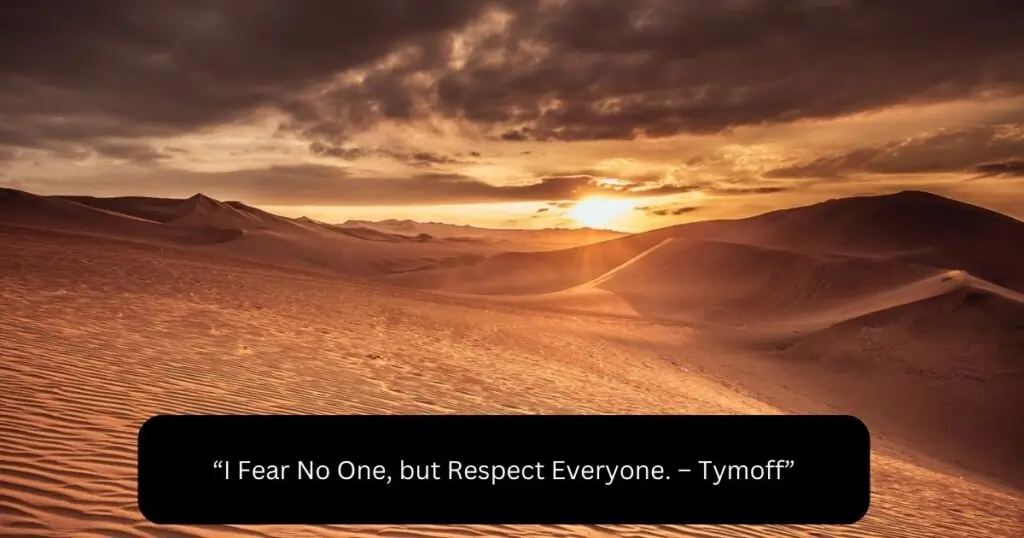
I Fear No One, But Respect Everyone – Tymoff: A Philosophy of Balance and Growth

In a world where personal and professional dynamics are ever-evolving, the balance between fearlessness and respect has become a crucial aspect of leadership, personal growth, and social harmony. The quote “I fear no one, but respect everyone – Tymoff embodies this philosophy.
It promotes self-confidence without arrogance and emphasizes the value of treating others with respect, regardless of status or opinion. In this article, we explore the meaning and impact of this mindset, and how it influences leadership, relationships, and personal development.
Understanding the Philosophy: I Fear No One, But Respect Everyone
At its core, the philosophy of “I fear no one, but respect everyone” advocates for a fearless mindset that isn’t rooted in intimidation, but in self-assurance. It encourages individuals to approach life’s challenges with boldness while remaining humble and respectful towards others. The strength of this approach lies in its dual emphasis on confidence and mutual respect, fostering trust and admiration in both personal and professional spheres.
By adopting this philosophy, individuals can rise above fear, making decisions without the paralysis that fear often brings. Simultaneously, the respect for others ensures that this confidence is tempered with empathy, kindness, and a genuine interest in the dignity of others. It is a leadership philosophy that transcends hierarchies and encourages open-mindedness and collaboration.
The Role of Fearlessness in Personal and Professional Growth
Fearlessness plays a pivotal role in personal growth by pushing individuals beyond their comfort zones. A person who embraces this attitude is more likely to take risks, seize opportunities, and face challenges head-on. Fearlessness, as Tymoff suggests, is not about being reckless but about having the courage to confront obstacles, learn from failures, and continue moving forward.
In the professional realm, fearlessness can lead to significant achievements. It emboldens leaders and employees to take initiative, innovate, and make bold decisions that drive success. Whether in a corporate boardroom or a personal endeavor, the fearless mindset promotes resilience and adaptability, essential qualities in today’s fast-paced and competitive world.
How Respect Differs from Fear
Respect and fear are often confused, but they are fundamentally different. Fear is driven by a desire to avoid negative consequences, often leading to resentment or compliance without real connection. Respect, on the other hand, is based on admiration, understanding, and recognizing the inherent value of others. This respect fosters trust, cooperation, and positive relationships.
In both professional and personal relationships, respect creates an environment of mutual understanding and growth. It allows for open dialogue, where individuals feel heard and valued, as opposed to fear-based environments that suppress creativity and collaboration.
The Importance of Balancing Fearlessness with Respect
Balancing fearlessness with respect is essential for maintaining humility and fostering productive relationships. Fearlessness without respect can come across as arrogance or aggression, potentially alienating others. Conversely, excessive respect without fearlessness can lead to subservience or a lack of assertiveness.

The key to success lies in striking the right balance—being fearless enough to stand firm in your convictions, but respectful enough to acknowledge and appreciate the contributions and perspectives of others. This balance is the foundation of effective leadership and harmonious interpersonal relationships.
Fearlessness and Respect in Leadership
Fearlessness and respect are the hallmarks of great leaders. Leaders who embody these traits inspire confidence in their teams and create an environment where collaboration thrives. Nelson Mandela and Mahatma Gandhi are prime examples of leaders who embodied fearlessness in their pursuit of justice while maintaining deep respect for humanity. Their leadership styles proved that one could stand firm in their beliefs without disregarding the dignity of others.
Leaders who embrace this philosophy not only command authority but also earn the respect and loyalty of their teams. They make bold decisions, take calculated risks, and encourage their teams to do the same—all while fostering a respectful, inclusive workplace culture.
Also Read: Shared Joy is a Double Joy; Shared Sorrow is Tymoff
The Impact of Fearlessness on Self-Confidence
Fearlessness is directly linked to self-confidence. When an individual learns to confront their fears and take action despite uncertainty, their confidence naturally grows. This sense of confidence is crucial for personal growth and success, as it empowers individuals to pursue their goals without being hindered by self-doubt.
In both personal and professional settings, self-confidence enables individuals to assert their ideas, take on leadership roles, and navigate challenges with grace. By fearing no one, individuals can break free from the constraints of societal expectations and develop a strong sense of self-worth.
Building Respectful Relationships in Personal Life
Respectful relationships are built on mutual understanding, empathy, and communication. In personal life, this translates into recognizing and valuing the perspectives, emotions, and needs of others. Respecting others does not mean agreeing with everything they say, but it involves listening and appreciating their point of view.
Fearlessness in personal relationships allows for open communication and vulnerability, which are essential for building strong, meaningful connections. When combined with respect, this approach fosters trust, loyalty, and long-lasting relationships.
How This Philosophy Enhances Mental Health
Fearlessness and respect also have a profound impact on mental well-being. A fearless attitude can significantly reduce anxiety, as individuals become more resilient in the face of challenges. When one is unafraid to face adversity, the weight of stress and worry lightens, leading to a more balanced mental state.

Practicing respect improves social interactions, leading to more fulfilling and supportive relationships, which are crucial for emotional stability. Respect fosters a sense of belonging and validation, making individuals feel valued, supported, and more mentally secure.
The Application of Fearlessness and Respect in the Workplace
In the workplace, adopting the “I fear no one, but respect everyone” mindset can be transformative. Fearlessness encourages innovation, risk-taking, and leadership, while respect ensures that collaboration and communication remain strong. Together, these principles create a workplace culture where employees feel empowered to contribute and share ideas without fear of judgment.
Leaders who embody this philosophy are more likely to foster teams that trust and collaborate effectively. This balance of fearlessness and respect leads to enhanced productivity, employee satisfaction, and organizational success.
Practical Steps to Adopt Fearlessness and Respect
Adopting a mindset of fearlessness and respect takes practice, but there are practical steps that can help:
- Be open to feedback – Embrace constructive criticism without taking it personally. This demonstrates both confidence and respect for others’ opinions.
- Take calculated risks – Step out of your comfort zone and face challenges head-on, knowing that failure is a stepping stone to growth.
- Respect others’ time and ideas – Show appreciation for colleagues’ contributions, and be mindful of their time and efforts.
- Stay assertive without being aggressive – Stand up for your beliefs while maintaining respect for others. Assertiveness coupled with empathy leads to positive interactions.
- Practice active listening – Listen to others without interruption, and genuinely consider their viewpoints.
Quick Facts
- Tymoff’s philosophy revolves around confidence and mutual respect.
- Fearlessness promotes self-confidence and personal growth.
- Respect is crucial for fostering positive relationships and workplace harmony.
- Leaders like Nelson Mandela and Mahatma Gandhi embodied this balance.
- Fearlessness and respect together lead to better mental health and emotional well-being.
Final Thoughts
The philosophy of “I fear no one, but respect everyone” as introduced by Tymoff offers a roadmap to achieving personal growth, leadership success, and meaningful relationships. By balancing fearlessness with respect, individuals can lead with confidence, build stronger connections, and create positive environments in both their personal and professional lives.
This philosophy encourages a mindset that not only conquers fear but also promotes compassion and empathy, paving the way for lasting success and fulfillment.
FAQs
What does “I fear no one, but respect everyone” mean?
It’s a philosophy that encourages self-confidence and fearlessness in facing challenges while maintaining respect and empathy for others, regardless of their status or opinion.
How can this philosophy improve leadership?
Leaders who balance fearlessness with respect inspire confidence in their teams, foster collaboration, and make bold decisions while valuing their team members’ contributions.
What is the difference between fear and respect?
Fear is driven by a desire to avoid negative consequences, often leading to resentment, while respect is based on admiration and recognition of others’ worth, fostering trust and cooperation.
How does fearlessness contribute to personal growth?
Fearlessness pushes individuals to take risks and face challenges head-on, which leads to personal and professional growth.
Can respect and fearlessness coexist?
Yes, when balanced properly, fearlessness enables assertiveness while respect ensures empathy and kindness in interactions.









